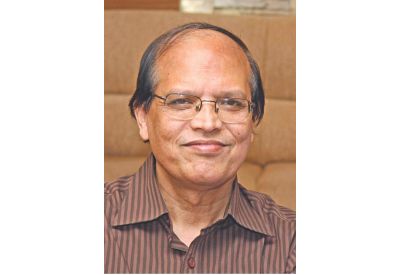Growth to remain above 6.5pc: BB governor Atiur says officials of WB, IMF and others appreciate Bangladesh's story
 Atiur Rahman
Atiur Rahman
Bangladesh's economy will grow by more than 6.5 percent in the current fiscal year although the global expansion is under-pressure, the central bank governor said.
"I think it will grow by more than 6.5 percent," Atiur Rahman told The Daily Star in Tokyo on Friday.
The governor is now in the Japanese capital to attend the semi-annual meetings of the World Bank and the International Monetary Fund.
His comments came as the IMF earlier forecast that Bangladesh's economy would grow by 6.1 percent in 2012 calendar year. Naoyuki Shinohara, a deputy managing director of the lending agency, said Bangladesh's GDP would grow by 5.8 percent in the current fiscal year.
"It is difficult to forecast the exact growth. We have noticed that historically Bangladesh's growth remains a bit higher than the projection made by the IMF. It has happened all the time and we have seen the pattern historically," Rahman said.
"But I would say that the IMF estimate reflects the global reality. It has forecast India's growth rate at 4.9 percent. Compared to India, IMF has made a positive projection about Bangladesh."
The governor, however, said the IMF estimation does not say that Bangladesh is being able to make up the losses in growth caused by the global meltdown through internal demand.
"Our agriculture is growing. I think it will grow by about 4 percent this year. That will make up some of the losses. Together, there is no chance the growth is going below 6.5 percent. It is not unrealistic too."
Rahman said the growth is under pressure worldwide. "There is no doubt about it. Definitely, Bangladesh will receive some of the heat."
He said the central bank has been cautious in terms of going for inclusive growth. "The quality of growth will ensure that even with the small growth we will have a better growth."
The governor attended a number of programmes and discussions at the IMF-WB annual meetings in the last several days.
"Everybody was saying that Bangladesh is actually a unique story. I have talked to officials from a number of countries. They said Bangladesh is a contrarian when it comes to the growth and inflation story. The Indian governor told me that Bangladesh is a bit separate from the bunch of the countries. We are an outlier in a positive sense."
Rahman said the country is maintaining its growth, the inflation is going down and the exchange rate is stable. In some cases, it is appreciating.
"The countries and the IMF are appreciating Bangladesh."
Rahman said the foreign currency reserves of Bangladesh also drew appreciation from the WB.
"Our current reserves of $11.5 billion can finance imports of three and a half months. If it touches $12 billion then we will be able to finance imports of four months.
"The WB officials are saying that Bangladesh's development story is very unique."
Rahman said he is more optimistic about Bangladesh's story after listening to the IMF managing director and the WB president.
"Both of them are not talking about one-track story. They are considering multiple factors and are going beyond the conventional kind of monetary management and policy story. They are talking about the multi-disciplinary kind of story. They are terming the WB as a solution bank."
He said he finds similarity of the central bank with the WB. "Our central bank is not a mono-track kind of central bank. We are encouraging banks to go for inclusive financing. We are allowing them to go green. From all sense, there was a resonance what the WB president has said and what we are doing in Bangladesh."
"We have already started to address the issues such as the financial stability, supervision and regulation as have been mentioned by the IMF managing director."
He said the capital adequacy requirement under the Basel-III would ultimately be good for the banking sector. "We have fixed capital adequacy ratio at 11-plus keeping that in mind, which will go up in 2018."
The governor said the WB is giving more emphasis on the regional cooperation. "We are also working on the issue. From the discussions, I found that Bangladesh is the most important country in case of regional hub."
The Bangladesh's delegation to Tokyo led by the finance minister also held meetings on the Padma bridge project.
On the issue, the governor said he thinks things are going positively. Confidence is building up.
He said, during this quarter the government's borrowing from the banking sector has been minimal, which is helping inflation come down.
The government and the central bank will have to maintain the existing level of coordination between them and improve it. "We can tell the world that many of the things that the WB president and the IMF MD said in Tokyo have already begun or were done."
"We are one of the few countries in the world who are really going for the inclusive growth, prudent monetary policy and we are tight while spending for the luxury goods. We are loose in case of productive agriculture and SMEs. We are working on the two legs."
Rahman also held meetings with top regional officials from Moody's and Standard and Poor's -- the world's two leading rating agencies.
"They also said they see no reason why the growth of Bangladesh will go below 6 percent."
It will remain 6 percent plus due to the performance of the agriculture sector, the governor quoted the officials as saying.
Rahman met Mauro Leos, regional credit officer of Moody's, and Elena Okorochenko, managing director of S&P's for Asia and the Pacific, in Tokyo.
Rahman said they also appreciated the government's decision to allow exchange rate flexibility when the taka was continuing to fall against the US dollar in November last year.
"They said: 'You had the guts to open your exchange rate'," Rahman said.
News: The Daily Star/Bangladesh/14th-Oct-12




Comments